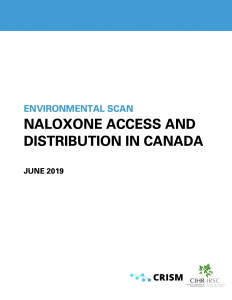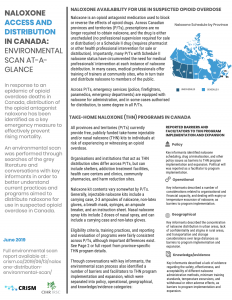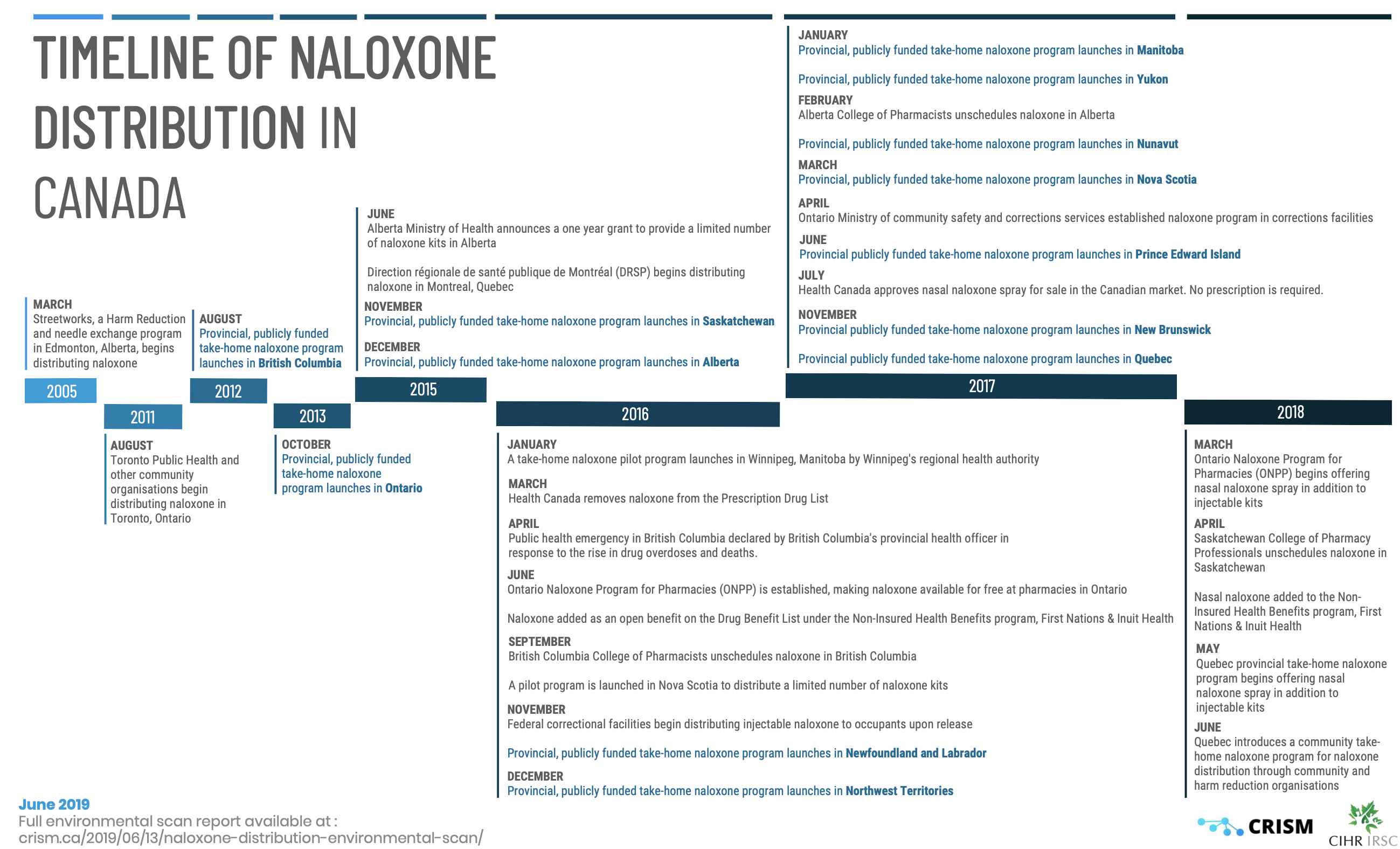CRISM Rapid Covid-19 Guidance Program Webinars
Program Overview
Supporting people who use substances in shelter settings during the COVID-19 pandemic
Supporting people who use substances in acute care settings during the COVID-19 pandemic
Shelter Settings – Rapid Covid-19 Guidance Document
Worker Safety Resources – Rapid Covid-19 Guidance Document
The following resources have been created to supplement the guidance document.
English documents
- Worker Safety All Recommendations
- Worker Safety Responding to an Overdose
- Worker Safety PPE for Staff
- Worker Safety During A Shift
- Worker Safety Outreach Recommendations
French documents
Acute Care Resources – Rapid Covid-19 Guidance Document
The following resources have been created to supplement the guidance document.
Naloxone Distribution Environmental Scan
In response to an epidemic of opioid overdose deaths in Canada, distribution of the opioid antagonist naloxone has been identified as a key emergency measure to effectively prevent rising mortality. As a result, the programs aimed to distribute publicly-funded naloxone kits have been launched across the country.
Between January and May 2019, CRISM developed an environmental scan to consolidate information regarding current practices and programs aimed to distribute naloxone for use in suspected opioid overdose in Canada. The environmental scan process reviewed available grey literature and used interviews with key informants to better understand access and distribution of naloxone across Canadian jurisdictions.
Released in June 2019, the scan finds that over 590,000 publicly-funded naloxone kits have been distributed across more than 8,700 distribution sites in Canada. More than 61,000 kits have been reported used to reverse an overdose. Currently, all provinces and territories maintain publicly funded take-home naloxone programs. While access to naloxone has increased across the country, there remain important barriers to achieving equitable access across communities.
Full environmental scan report
Environmental scan at-a-glance
Presentations to National Anti-Drug Strategy Working Group
This presentation was made by Dr. Julie Bruneau to the National Anti-Drug Strategy working group on Sept 15, 2016. The focus of the presentation was introduction to the CRISM Network and the National OPTIMA Trial.
CRISM NADS working group presentation Sept 15th 2016
This presentation was made by Dr. Cam Wild to the Drugs and Substances Strategy working group on Feb 7, 2017. The focus of the presentation was CRISM Network national and regional substance use prevention projects.
Addiction Day 2017
9th Annual Addiction Day and Scientific Conference – May 26th, 2017
The vision of the Addiction Day Conference and Networking Fair is to increase public awareness of addiction and mental health problems, and to enhance knowledge, competencies and treatment care. Through a combination of diverse presentations, workshops and networking opportunities, we hope to bring together healthcare professionals from across the care continuum for a day of learning and discussion.
9th Annual Addiction Day Networking Fair
In recognition of the many different organizations that promote and provide recovery-oriented services to clients and families in Alberta, we are pleased to continue our tradition of an Annual Networking Fair during our Addiction Day Conference.
Detoxification, opioid dependency programs, residential/inpatient, outpatient, and community services are an integral component of effective treatment. The Addiction Day Networking Fair would like to highlight these exceptional services that span our addiction and mental health care continuum.
Please stay tuned: registration for these booths will be opening February 1st on a “first come, first serve” basis.
Registration for the conference and more information will be available February 1st.
For more information go to: Addiction Day May 26 2017 Calgary AB
Canadian Knowledge Mobilization Forum 2017
The Canadian Knowledge Mobilization Forum was created in 2012 as a professional development forum for practitioners and professionals working in knowledge mobilization across fields and sectors.
It has become recognized as a premiere learning and networking event in Canada – friendly, open, limited in size, and creative. Events have been held in Ottawa (2012), Mississauga (2013), Saskatoon (2014), and Montréal (2015), Toronto (2016), and is scheduled for May 17-18, 2017 in the National Capital Region of Canada, Ottawa-Gatineau.
The theme for 2017 is:
Connections and Partnerships: Collaboration as a Key to Knowledge Mobilization
From the very start of the conversation about Knowledge Mobilization in Canada, connections and partnerships have been part of the narrative. Collaboration is a key component of many, if not most activities in Knowledge Mobilization. True to the meaning of the word, collaboration is often hard work. It requires us to co-labor together, to co-construct priorities, programs, policies, processes that lead to the use of evidence. Together, we build better communities and societies.
The theme for 2017 focuses us on how to be better together. We invite participation that will push thinking and engagement of the knowledge mobilization community further. The Forum will be hosted at the Canadian Museum of History and the Sheraton Four-Points Gatineau Hotel.
We are seeking presentations, posters, workshops, and open-space activities that facilitate active participation, networking, reflection and learning.
We are driven by an objective of allowing you to design your own conference experience that reflects your interests, experience, priorities and learning styles. Drawing on the assets of the National Capital Region, leaders in knowledge mobilization from all across Canada and beyond, it is our hope you will come away from CKF17 enriched, energized and engaged in this field like never before.
Our objectives are:
- Build on the past successes of CKF make this a preeminent event to learn and engage about knowledge mobilization in Canada
- Build capacity for knowledge mobilization
- Learn about work in other sectors to enable partnerships and collaboration
- Engage with leaders to influence future directions
- Meet the next generation of leaders and create opportunities to mentor and coach
- Access the latest tools, techniques and opportunities.
The 2017 Canadian Knowledge Mobilization Forum is seeking contributions for content, which addresses the overall theme of Connections and Partnerships: Collaboration as a Key to Knowledge Mobilization, and links to the subthemes of:
Subtheme 1: Structures – What (for example: operating structures supporting partnerships, agreements, management systems, office layouts enhancing collaboration )
Subtheme 2: Processes – How (for example: tool boxes, networks, communities of practice, training)
Subtheme 3: Technology – Technology and Tools (for example: social media, apps, software, knowledge boards, database mining, CRM programs)
We are continuing to use the “The Knowmo Scale”. Here, we’re seeking presenters to consider their audience. Consider this our own unique variation of the Scoville Unit scale.
Is your presentation focused around skill development? If so, you would check off Knowmo 1.
Will you present on where we are in terms of KMb? If so, you would check off Knowmo 2.
Does your presentation focus on innovation in/for KMb? If so, please check off Knowmo 3.
For more information go to: Canadian Knowledge Mobilization Forum May 17,18 2017 Ottawa ON
Canada’s Drug Futures Forum 2017
Join us in Ottawa this April to map out the next decade of drug policy reform in Canada
Recent decisions by the Canadian government concerning harm reduction, opioids, cannabis, and sentencing are signalling a new approach to managing illicit drug use in Canada.
Meanwhile, a new US administration promises to strengthen an already punitive narcotics regime with consequences for control efforts abroad as well as for cannabis policies in many US states.
This fast-changing landscape makes now the right time to bring together leading voices from across the country to look across the next decade and help identify new opportunities and directions for drug policies in Canada.
On April 4 – 5, 2017, join us as more than 120 researchers, policy-makers, public health officials, law enforcement professionals, drug users and community organizers meet in Ottawa to examine the future of Canada’s domestic and international drug policies.
Hear from more than a dozen speakers and participate in four discussion streams to help shape recommendations concerning:
• International control and management
• Decriminalization, regulation and harm reduction
• Integrating policing and public health
• Strategies for health and social equity
For more information gCanada’s Drug Futures Forum Apr 4,5 2017 Ottawa ON



